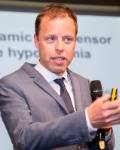
![]() Access a searchable transcript of this video by clicking the magnifying glass icon in the player.
Access a searchable transcript of this video by clicking the magnifying glass icon in the player.
Join speakers Jan Siemens, PhD, and Kavli Prize Laureate Eve Marder, PhD, for the second session of a collaborative series by the Society for Neuroscience and The Kavli Foundation. Moderated by Laura Duvall, PhD, this webinar will explore mechanisms by which nervous systems in both warm and cold-blooded organisms acclimate to temperature extremes, offering insights into neuromodulatory adaptation and plasticity across species with drastically different nervous system organizations. Presentations and discussions will highlight recent advances in the field, shedding light onto mechanisms of neural adaptation in changing environments.
Q&A from Neuromodulatory Adaptation and Plasticity in Changing Environments
Q: Is anything known about whether peptidergic signaling from thermostat neurons (e.g. PACAP or QRFP) is required for the adaptations to increased temperatures?
A: This is a very interesting question and one we would like to investigate in the future, if somebody joined our team who would like to study this. I like to think that likely PCAP, BDNF and/or QRFP released from these neurons may play a role at downstream targets, but at this point I can only speculate.
Q: Considering crustaceans are cold blooded, can we expect an upregulation in heat shock proteins?
A: We do see upregulation of heat shock proteins in response to high temperature, as well as in response to other perturbations such as high K concentrations.
Q: Do you think high temperatures may cause increased seizure frequencies in epileptic patients?
A: It is well-documented that many people with seizure disorders have increased seizure activity in response to temperature extremes.
Q: What is the opinion of the speakers on the contrast between homeostasis and allostasis, and does your work align more with one or the other at the conceptual level?
A: In addition to allostasis, rheostasis helps explain how organisms adapt to changing environments. Allostasis involves achieving stability through change, while rheostasis means adjusting the body’s set points (like body temperature or activity levels) themselves. Unlike homeostasis, which keeps set points constant, rheostasis allows them to shift—for example, a slightly higher body temperature in warmer conditions.
If stress is too strong or prolonged, these adjustments can cause allostatic load, leading to wear and tear or disease. Our research suggests that increased VMPO neuron activity in mice exposed to heat drives rheostatic shifts, helping define new set points better suited to the new environment. While these changes may help prevent some diseases, they probably have costs too, like reduced lifespan or other risks. Balancing these benefits and costs is key to understanding how organisms adapt.
Q: How did you measure recovery in the thermostat neurons subjected to heat stress quantitatively over a set period of time?
A: We prepared slices of mice at different time points during heat acclimation and then also during “de-acclimation”, when the animals were returned to normal room temperatures. We found that it takes about a week for the activity of the neurons to go back to the level that they had prior to heat acclimation. This is shown in this publication ( https://pubmed.ncbi.nlm.nih.gov/39653806/ in Fig. 2b) – I like to think that the process is completely reversible, as are the physiological changes that occur during heat acclimation (e.g. the mouse loses its Brown adipose tissue (BAT) in hot environments and, once returned to normal coolish conditions grows back its BAT). However, we have not systematically measured any other parameter of the cells after returning the mice back to normal temperatures -- it's possible (perhaps even likely) that a “memory” of the heat acclimation remains in the neurons.
Speakers



Who can attend this webinar? This webinar will be complimentary.
Will this webinar be available on demand? Yes, this webinar will be available on demand one week from the live broadcast.
Will a certificate of attendance be offered for this event? No, SfN does not provide certificates of attendance for webinars.
How do I access the conference on the live day? After registering, you will receive a confirmation email with the event link and the option to download calendar reminders.
What are the technology requirements for attending? This webinar will be hosted on Zoom Webinar. Instructions for joining and participating in a webinar can be found here.
Can I ask the presenters questions? Yes! You can submit any questions before the webinar through the registration form. During the webinar, you can submit questions through the Q&A box.
I have other questions not answered here. Email digitallearning@sfn.org with any other questions.
Review SfN’s Code of Conduct, rules for virtual events in the Digital Learning Community Guidelines, and communications policies regarding dissemination of unpublished scientific data, listed below. SfN asks that conference attendees respect the sensitivity of information and data being presented that are not yet available to the public by following these guidelines:
- Do not capture or publicly share details of any unpublished data presented.
- If you are unsure whether data is unpublished, check with the presenter.
- Respect presenters' wishes if they indicate that the information presented is not to be shared.







